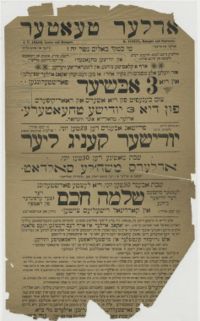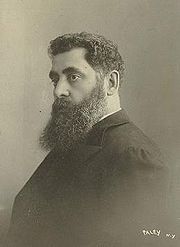
The Yiddish King Lear
Encyclopedia


Drama
Drama is the specific mode of fiction represented in performance. The term comes from a Greek word meaning "action" , which is derived from "to do","to act" . The enactment of drama in theatre, performed by actors on a stage before an audience, presupposes collaborative modes of production and a...
gained prominence over operetta
Operetta
Operetta is a genre of light opera, light in terms both of music and subject matter. It is also closely related, in English-language works, to forms of musical theatre.-Origins:...
.
Gordin, a respected intellectual and Yiddish-language novelist, had been recruited by Jacob Adler
Jacob Pavlovich Adler
Jacob Pavlovich Adler , born Yankev P. Adler, was a Jewish actor and star of Yiddish theater, first in Odessa, and later in London and New York City....
in an effort to create a more serious repertoire for Yiddish theater, comparable to what he knew from Russian
Russian language
Russian is a Slavic language used primarily in Russia, Belarus, Uzbekistan, Kazakhstan, Tajikistan and Kyrgyzstan. It is an unofficial but widely spoken language in Ukraine, Moldova, Latvia, Turkmenistan and Estonia and, to a lesser extent, the other countries that were once constituent republics...
theater. His first two plays, Siberia and Two Worlds had failed commercially, although Siberia was later successfully revived.
The play is not a translation of Shakespeare's King Lear
King Lear
King Lear is a tragedy by William Shakespeare. The title character descends into madness after foolishly disposing of his estate between two of his three daughters based on their flattery, bringing tragic consequences for all. The play is based on the legend of Leir of Britain, a mythological...
, but the title is an acknowledgement of the roots of the plot. It begins at the Purim
Purim
Purim is a Jewish holiday that commemorates the deliverance of the Jewish people in the ancient Persian Empire from destruction in the wake of a plot by Haman, a story recorded in the Biblical Book of Esther .Purim is celebrated annually according to the Hebrew calendar on the 14th...
feast given by David Moishele, a wealthy Russia
Russia
Russia or , officially known as both Russia and the Russian Federation , is a country in northern Eurasia. It is a federal semi-presidential republic, comprising 83 federal subjects...
n Jewish merchant in mid-19th century Vilna, personification of what Adler referred to as the "Grand Jew", surrounded by family, friends, servants: in effect, a monarch in his court. As he divides his empire, the story of Shakespeare's Lear is recounted to him as a warning by the virtuous daughter who denied his authority by becoming a student in St. Petersburg
Saint Petersburg
Saint Petersburg is a city and a federal subject of Russia located on the Neva River at the head of the Gulf of Finland on the Baltic Sea...
. He is destined to follow in the same path to ruin and madness; unlike Shakespeare's Lear (but quite like the way Lear was often staged from the English Restoration
English Restoration
The Restoration of the English monarchy began in 1660 when the English, Scottish and Irish monarchies were all restored under Charles II after the Interregnum that followed the Wars of the Three Kingdoms...
well into the 19th century), there is a relatively happy ending, with differences set right and David Moishele living to forgive and be reconciled with his children.
The husbands of the daughters among whom David Moishele divides his "kingdom" are, respectively a Hasid, an Orthodox Jewish
Orthodox Judaism
Orthodox Judaism , is the approach to Judaism which adheres to the traditional interpretation and application of the laws and ethics of the Torah as legislated in the Talmudic texts by the Sanhedrin and subsequently developed and applied by the later authorities known as the Gaonim, Rishonim, and...
businessman, and an apikoyres (a secular Jew: the word derives from Epicurean).
The title role became a pillar of Adler's image and career. Theater Magazine wrote of Adler's performance in a 1901 revival of The Yiddish King Lear, "No finer acting has ever been seen in New York than Adler's gradual transition from the high estate of the Hebrew father distributing his bounty in the opening scenes to the quavering blind beggar of later developments." After Adler's 1920 stroke, when he was nearly paralyzed, on several occasions he played Act I of The Yiddish King Lear as part of a benefit performance: his character remained seated throughout this act.
The play was made into a 1934 Yiddish-language film. The play continues to be revived often, and there have been several recent English-language translations and adaptations. http://www.jewishculture.org/theater/theater_npc_2004.html http://www.windriverpress.com/authors.html
External links
- Plot summary
- Translation
- Yiddish King Lear on the Relief Roll - article in The ForwardThe ForwardThe Forward , commonly known as The Jewish Daily Forward, is a Jewish-American newspaper published in New York City. The publication began in 1897 as a Yiddish-language daily issued by dissidents from the Socialist Labor Party of Daniel DeLeon...

